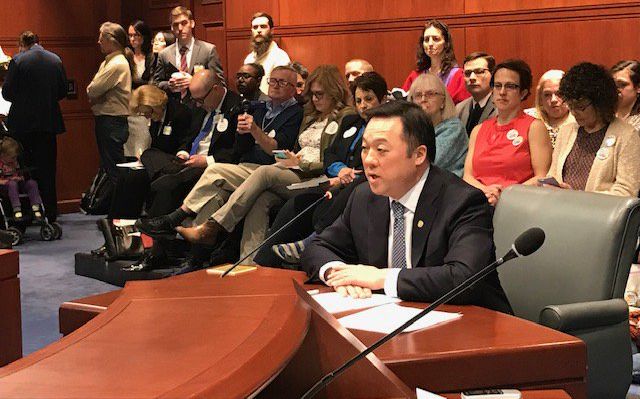
Processing Your Payment
Please do not leave this page until complete. This can take a few moments.
- News
-
Editions
View Digital Editions
Biweekly Issues
- May 13, 2024
- April 29, 2024
- April 15, 2024
- April 1, 2024
- March 18, 2024
- March 4, 2024
- February 19, 2024
- February 5, 2024
- January 22, 2024
- + More
Special Editions
- Lists
- Viewpoints
- HBJ Events
- Business Calendar
- Custom Content
Tong gives labor a lift on ‘captive audience’ bill
 Photo | Office of the Attorney General
Attorney General William Tong.
Photo | Office of the Attorney General
Attorney General William Tong.
With a new legal opinion, Attorney General William Tong has given a boost to the long campaign by labor to pass “captive audience” legislation, a measure unions say is needed to protect employees from coercion during organizing drives, but business calls an illegal infringement of management free-speech rights.
Tong delivered a split opinion on two labor bills now before the state legislature: On one, Tong stood by his predecessor’s opinion that the federal National Labor Relations Act preempts action by the state; but Tong concluded that a second version “can be fairly defended as outside the scope of NLRA preemption as articulated by the courts.”
Tong, a Democrat elected last year with the backing of the Connecticut AFL-CIO, issued the formal opinion on the two Senate labor bills in response to a request by Senate Minority Leader Len Fasano, R-North Haven, one of the Republicans who have questioned Tong’s ability to deliver an unbiased opinion on labor issues.
“I am very concerned about Tong,” Fasano said Monday. “He has been very clear when he speaks in front of unions and when he ran where he stood on union issues.” He said Tong should have recused himself.
But Tong said his assessment was consistent with that of his predecessor, George Jepsen, and that his involvement came at the invitation of a Republican leader, not a union.
“Let me be clear: I was asked for my opinion by the Republican leader of the Senate. I have done nothing to politicize this issue or take sides,” Tong said. “I’m not injecting myself into this, politicizing it or making it an issue. There is a legislative proposal, and I was asked my opinion on that.”
Jepsen informally raised concerns about preemption in 2011, effectively killing a captive audience bill that had been passed by the House and was before the Senate that year. In 2018, Jepsen issued a formal opinion about another captive audience bill.
By offering differing opinions on two bills, Tong agreed with unions that the state could pursue a captive audience bill, while not directly contradicting Jepsen.
Tong said one of the bills proposed this year, Senate Bill 64, is nearly identical to a 2018 version that Jepsen said was preempted by federal law. But Tong said in his opinion that the other, Senate Bill 440, “is materially different from the proposed legislation that was the subject of the 2018 Opinion.” The latter is awaiting action on the Senate calendar.
In his opinion and during a telephone interview Monday, Tong said that Senate Bill 440 is more narrowly written than other versions. It would bar employers from forcing employees to attend meetings pertaining to religious and political issues, while specifying that employers are free to compel attendance on other work-related subjects.
“It’s nuanced, I get that,” Tong said. “I’m not saying we’re not going to get challenged. I’m saying this is what the law says, and I’m ready to defend it.”
Tong said Senate Bill 440 builds on existing protections in state law that allow employees to leave meetings of a religious or political nature, the latter including a discussion of unionization.
In his opinion, he wrotethat SB 440 “would advance this purpose by amending and clarifying an existing statute and expressly defining the rights protected to include ‘the right to freedom of speech, freedom of religion and freedom of association, and shall include the right not to be required to listen to speech.’ ”
But employers would retain the right to compel attendance on a wide range of management concerns, such as safety policies, and to discipline those who decline.
Fasano said there are no significant differences in the two bills, leaving him to view Tong’s opinion as a political analysis, not a legal one.
“When you look at the merits, they don’t hold water in my view,” Fasano said.

Eric Gjede, the vice president for government affairs for the Connecticut Business and Industry Association, said the two bills are built around the same language, and “stuffing” the provisions of Senate Bill 440 into the framework of existing law does not change that.
“The language is almost identical,” Gjede said. “We continue to stand by our argument it’s preempted by federal law.”
Tong leads a law office that defends the state against litigation and enforces consumer-protection, environmental and other laws by seeking civil penalties, and he is free as an elected official to suggest changes in public policy. But in issuing formal opinions, the attorney general is performing a quasi-judicial task as the governor and legislators rarely defy an opinion that a law would be indefensible.
Sen. Julie Kushner, D-Danbury, a retired UAW executive who is co-chair of the legislature’s Labor and Public Employees Committee, said Tong’s opinion was both welcomed and well-defended.
“I think it’s a very thoughtful analysis of the question that was before him. He confirms that it is not preempted,” Kushner said. “I feel like it’s a good decision, and it clears the way for us to pass this bill in the Senate and establish protections of constitutional rights of workers while they are at work.”
Rep. Dave Rutigliano, R-Trumbull, the ranking Republican on the labor committee, said he saw no need for the bill.
“I may be naive, but I don’t know of too many employer-employee relationships that are that contentious. I think in the real world they are a lot less contentious than maybe some of the advocates think they are,” Rutigliano said.
Sal Luciano, the president of the AFL-CIO, said private-sector workers often are pressured during organizing campaigns. He described cases of housekeepers at the health facilities being followed into supply closets by managers pressing them not to unionize.
Of the relatively low success rates of organizing private employers, Luciano said. “This issue is one of the reasons why that doesn’t happen.”
Gjede of CBIA said passage of the bill would send an anti-business message: “If you come to Connecticut, you can’t talk to your own employee.”
Luciano said the message is you can talk, just not coerce.

2022 Giving Guide
This special edition informs and connects businesses with nonprofit organizations that are aligned with what they care about. Each nonprofit profile provides a crisp snapshot of the organization’s mission, goals, area of service, giving and volunteer opportunities and board leadership.
Learn more
Subscribe
Hartford Business Journal provides the top coverage of news, trends, data, politics and personalities of the area’s business community. Get the news and information you need from the award-winning writers at HBJ. Don’t miss out - subscribe today.
Subscribe
2024 Book of Lists
Delivering Vital Marketplace Content and Context to Senior Decision Makers Throughout Greater Hartford and the State ... All Year Long!
Read Here-
2022 Giving Guide
This special edition informs and connects businesses with nonprofit organizations that are aligned with what they care about. Each nonprofit profile provides a crisp snapshot of the organization’s mission, goals, area of service, giving and volunteer opportunities and board leadership.
-
Subscribe
Hartford Business Journal provides the top coverage of news, trends, data, politics and personalities of the area’s business community. Get the news and information you need from the award-winning writers at HBJ. Don’t miss out - subscribe today.
-
2024 Book of Lists
Delivering Vital Marketplace Content and Context to Senior Decision Makers Throughout Greater Hartford and the State ... All Year Long!
ABOUT
ADVERTISE
NEW ENGLAND BUSINESS MEDIA SITES
No articles left
Get access now
In order to use this feature, we need some information from you. You can also login or register for a free account.
By clicking submit you are agreeing to our cookie usage and Privacy Policy
Already have an account? Login
Already have an account? Login
Want to create an account? Register
Get access now
In order to use this feature, we need some information from you. You can also login or register for a free account.
By clicking submit you are agreeing to our cookie usage and Privacy Policy
Already have an account? Login
Already have an account? Login
Want to create an account? Register






0 Comments